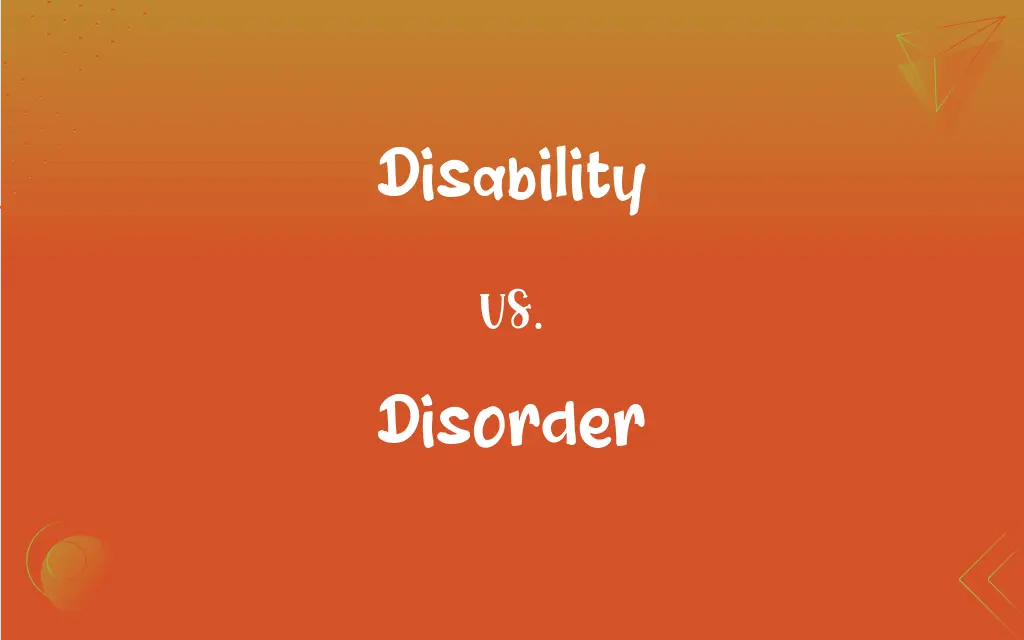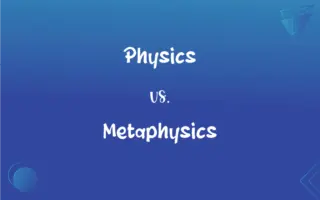Disability vs. Disorder: What's the Difference?
Edited by Aimie Carlson || By Janet White || Published on December 7, 2023
"Disability refers to a physical or mental impairment that limits activities, while disorder denotes a disruption in normal function, often related to health or psychology."

Key Differences
Disability is a condition that significantly impairs an individual's physical or mental abilities, affecting daily activities. A disorder, however, refers to an irregularity, disturbance, or abnormality in physical or mental health.
Disabilities can be congenital or acquired, impacting mobility, cognition, or sensory functions. Disorders encompass a wide range of health issues, from psychological disorders to systemic physical ailments.
Disabilities often require accommodations in daily life, education, and employment. Disorders may or may not lead to disabilities, depending on their nature and severity.
Disability is a broad term that can include long-term effects of certain disorders. While disorders can be transient or chronic, not all disorders result in a disability.
The management of disabilities often focuses on enhancing functional abilities and independence. Treatment of disorders usually aims at correcting or managing the specific health issue.
ADVERTISEMENT
Comparison Chart
Definition
Impairment in physical or mental abilities
Disruption or abnormality in body or mind function
Examples
Paralysis, blindness, autism
Anxiety disorder, diabetes, heart disease
Impact
Limits daily activities and participation
May affect health, behavior, or bodily function
Duration
Often long-term or permanent
Can be transient, recurrent, or chronic
Focus
Accessibility, accommodation, and independence
Treatment and management of specific health issues
ADVERTISEMENT
Disability and Disorder Definitions
Disability
A condition that hinders the completion of daily activities.
Learning disabilities require specific educational strategies.
Disorder
A condition characterized by abnormality in a bodily system.
Type 1 diabetes is an autoimmune disorder.
Disability
A state of reduced physical or mental capability.
Sign language interpreters assist those with hearing disabilities.
Disorder
A mental or behavioral pattern causing distress or poor ability to function.
He was diagnosed with a mood disorder.
Disability
A physical or mental condition that limits a person's movements, senses, or activities.
Wheelchair ramps are essential for people with mobility disabilities.
Disorder
A disruption of normal physical or mental functions.
Generalized anxiety disorder affects her daily life.
Disability
A long-term limitation in a person's body or brain function.
Accessible websites are important for people with various disabilities.
Disorder
A state of health characterized by particular symptoms or behaviors.
Attention-deficit/hyperactivity disorder (ADHD) affects her focus at school.
Disability
An impairment that affects a person's ability to perform certain tasks.
He uses a special keyboard due to his visual disability.
Disorder
An illness that disrupts normal physical or psychological functions.
Eating disorders require comprehensive treatment plans.
Disability
A physical or mental condition that significantly limits a person's motor, sensory, or cognitive abilities.
Disorder
A lack of order or regular arrangement; confusion.
Disability
The state of having such a condition
Discrimination based on disability.
Disorder
A breach of civic order or peace; a public disturbance.
FAQs
What does disorder mean?
A disruption in normal body or mind functions.
Do disorders always cause disabilities?
Not always; some disorders do not lead to disabilities.
Are all disabilities visible?
No, many disabilities are not immediately apparent.
What is a disability?
A condition impairing physical or mental abilities.
Are mental health issues disorders?
Yes, mental health issues are often classified as disorders.
What's an example of a physical disorder?
Asthma is a common physical disorder.
Can a disorder lead to a disability?
Yes, some disorders can result in disabilities.
Is autism a disability or disorder?
Autism is often considered both a disability and a disorder.
Can disabilities be treated?
Some can be managed, but many are lifelong conditions.
Do people with disabilities always need assistance?
Not always; many live independently with or without accommodations.
Are disorders genetic?
Some disorders have genetic components.
Do disabilities affect mental health?
They can, as living with a disability may impact mental well-being.
Is a learning disability a mental disorder?
Learning disabilities are generally categorized as developmental disabilities.
How is a disability diagnosed?
Through medical assessments and evaluations.
Are disabilities always congenital?
No, they can also be acquired later in life.
What types of disorders are there?
There are many, including mental, physical, and behavioral disorders.
Can lifestyle impact disorders?
Yes, lifestyle choices can influence the onset and management of some disorders.
Can therapy help with disorders?
Yes, therapy is often key in managing many disorders.
Are all disabilities permanent?
Many are, but some temporary conditions can also be considered disabilities.
Can disorders be cured?
Some can be treated effectively, while others are chronic.
About Author
Written by
Janet WhiteJanet White has been an esteemed writer and blogger for Difference Wiki. Holding a Master's degree in Science and Medical Journalism from the prestigious Boston University, she has consistently demonstrated her expertise and passion for her field. When she's not immersed in her work, Janet relishes her time exercising, delving into a good book, and cherishing moments with friends and family.
Edited by
Aimie CarlsonAimie Carlson, holding a master's degree in English literature, is a fervent English language enthusiast. She lends her writing talents to Difference Wiki, a prominent website that specializes in comparisons, offering readers insightful analyses that both captivate and inform.






































































